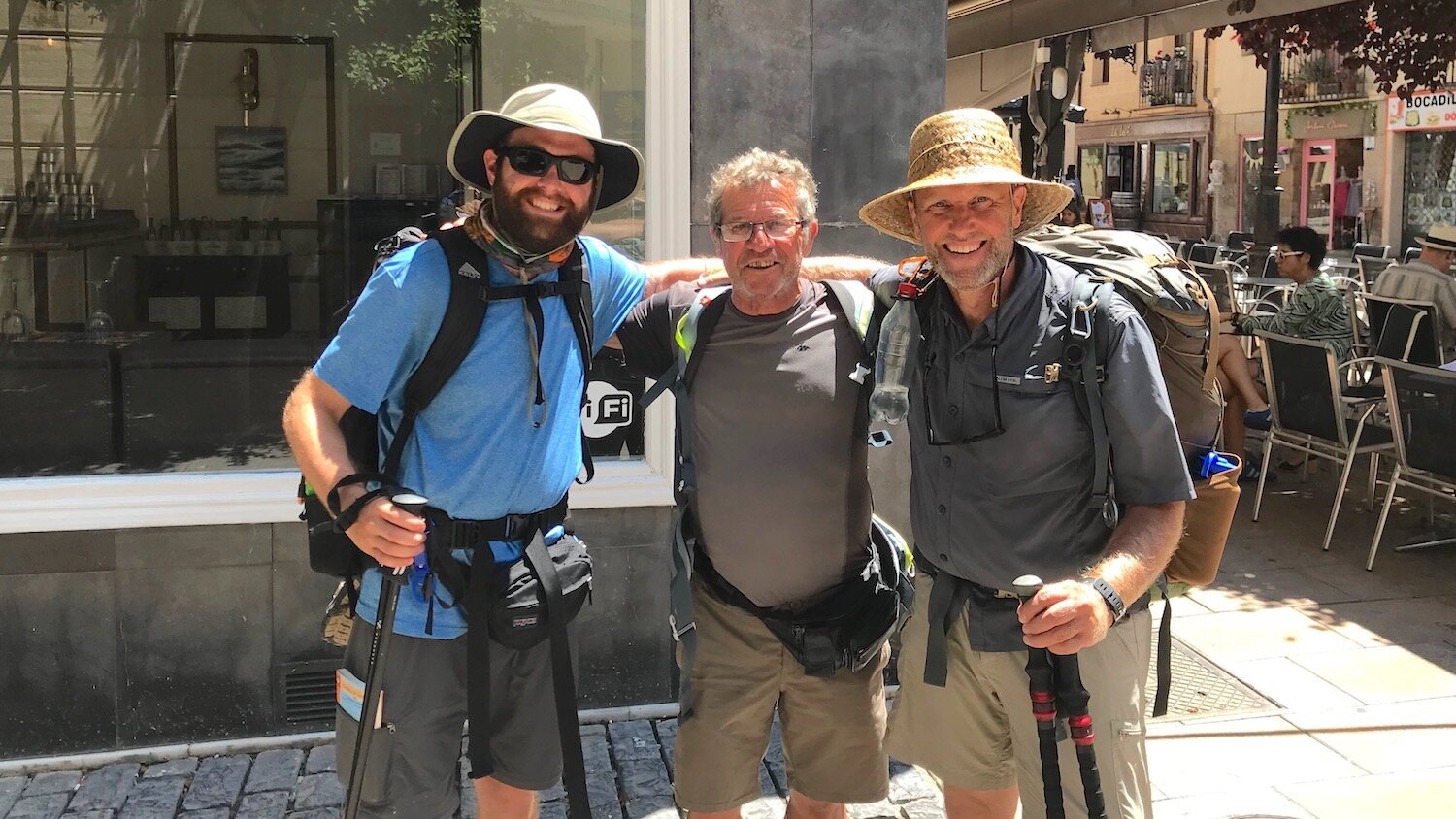Bob and I arrived in Zubiri and grabbed two bunks in the “muni.”
A “municipal” on the Camino Francés is a cheap place to sleep for a night. When I use the word cheap here, think six or seven dollars. When I use the word sleep here, interpret it broadly. It may be anything from the state of pure slumber to the act of lying in the fetal position while praying for sunrise.
The Zubiri Municipal was formerly a schoolhouse. Image from here (accessed 9/11/2021).
“Municipals” are public hostels owned and operated by a community. Municipals vary greatly in size, cleanliness, and services offered, but typically consist of a common room, some kind of shared kitchen, bathroom stalls, shower stalls, and a sleeping area. Sometimes the sleeping area is smallish with ten or twelve beds. Others can be huge spaces with sixty beds or more. Beds consist of a single mattress in a plastic cover on a frame without blankets or sheets. For this reason, Spain walkers need to carry their own sleeping gear (sleep sack or bag).
Many munis are first-come, first-serve. No reservations are taken. As summer-time peregrinos do their best to avoid walking the heat of the day (and believe me, Spain is hot in July!), it is good to grab a bunk in the early afternoon before it fills. Wait too long, and you may be walking with el sol caliente as your blistering companion.
Our sleeping area in Zubiri’s muni. That’s my backpack on the floor. Did I remember my earplugs?
Alternative accommodations to the muni may be found. These include other types of alburgues or hostels, pensiones, regular hotels, luxury hotels, church floors and, of course, the hard ground which is always readily available. Choices hinge on season of travel, strength of competition, and the depth of pocketbook. Obviously, bigger cities offer more options than country villages.
Because the Camino is a social experience that moves at a footpace along a restricted channel, the chances are high that one will encounter the same people over and over again in coffee-shops, churches, or in the bunk above your head. This can be a good thing . . . Teams and tribes form naturally.
Approaching the village of Maneru, Spain. Teams form on the basis of language, interest, speed of travel, and snoring habits.
Bob and I fell into an odd coterie for a while. Greg and Honi were a part of it.
It was Greg’s second time to walk the Camino. He wanted to walk solo on this do-over since he partied most of the way across on his first attempt and didn’t remember much. Stamped with an extroverted nature, he was doomed to repeat his excesses. Greg was an invaluable source of intel on many things we wanted to know and a few things that we didn’t.
Honi couldn’t walk so well. He developed a knee problem coming over the Pyrénées and we feared we would have to carry him out at some point. He was from France and didn’t speak a lick of English. Nevertheless, Honi was a good trail-mate. He communicated using hand signals, facial expressions, and a variety of odd noises that would have made Harpo Marx envious.
A grizzly trio.
Greg, Harpo-Honi, Bob, and myself connected for the first time in Zubiri. There, we learned three lessons on the muni scene.
First, Zubiri taught us to hoard toilet paper. It would not be guaranteed at every stop. In retrospect, the same might be said of toilets in all of Spain. Their rarity suggests that the locals have been gifted with enormous bowel capacities.
Second, Zubiri taught us about the threat of fresh air (a phobia that extends across the Mediterranean world). What this means in practice is that even if it is a thousand degrees inside a room, one should never open a window, lest the outside air rush in and grip everyone with fever. Given what I’ve witnessed in hostels, fresh air seems to be most lethal at night.
And third, Zubiri taught us to fear the chinches.*
Actually, it was Greg, the Camino-veteran, who taught us this lesson. He chose his bunk and inspected it carefully. He calculated the angle of the sun and paced the distance to the outside door and the bathroom. With a flashlight he inspected all his bed frame crevices. He stared at his mattress as if he had never seen such a thing before, then suddenly flipped it with great enthusiasm. We all fell back, surprised, but he leaned forward to watch for tiny movements. Finally, he pulled out a can of aerosol bug spray and fumigated the entire district. Satisfied, he threw himself facefirst into the cloud and stretched out his long frame. It was an impressive display.
Closeup of a bedbug licking his chops. Image from here (accessed 9/17.2021).
Surrounded by our new friends, the windows were closed at 10:00 pm to protect us all from the fresh air. An invisible hand flipped the lights out. I listened to the odd breathing noises of Harpo-Honi and the others. The air was thick like wet socks. I slapped my leg, certain of a crawling sensation.
¡Buen Camino!
*Chinches is Spanish for “bedbugs.” These tiny vampires (Cimex lectularius) hide by day but come out in the night. They are particularly fond of peregrino blood.
Join Mark and Vicki for a Mediterranean experience May 25-June 5, 2022. We'll be cruising aboard the luxurious Celebrity Infinity. See the link here for details. Onboard lectures will provide focus for the group as we visit the ports of Olympia, Santorini, Ephesus, and Athens among others. Optional add-on visits to Venice or Rome are possible on either end of the trip. Contact me at markziese@gmail.com.





